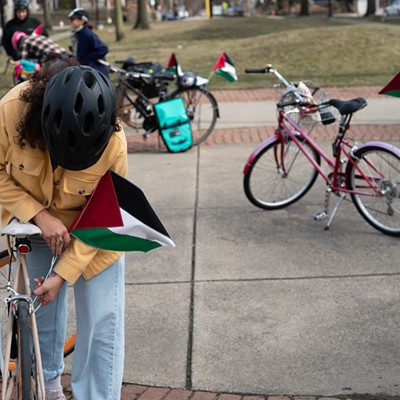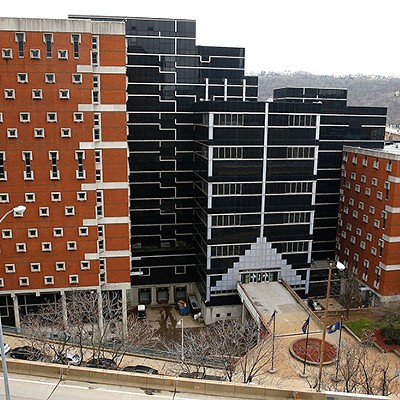Last month, Pennsylvania Attorney General Michelle Henry announced the takedown of a multi-state sex trafficking ring near Pittsburgh. Among those involved were two women and one girl — a minor — who were shut in a hotel room in Monroeville and forced to perform sex acts while fearing for their lives. Reportedly, in this case, one victim was recruited at 12 years old.
Popular movies have led some Americans to believe that sex trafficking primarily occurs in developing countries. The 2023 movie The Sound of Freedom, which was heavily promoted by right-wing political pundits, depicts sexual exploitation in Colombia but fails to outline the problems faced in places such as Western Pennsylvania.
In reality, human trafficking is less sensational, and statistics show that a majority of victims are recruited by family members or other people close to them. Local survivor and advocate Karleigh Maide, who was trafficked at age 15, gives insight into the problem. “It's someone you trust or have grown some level of bonding with through the grooming process,” Maide says.
Traffickers often develop relationships with their victims first, whether in person or through the internet. Social media is a convenient way for traffickers to seek out and groom vulnerable children and adults. The exploitation occurs after developing trust and an emotional connection. Frequently, sex traffickers manipulate vulnerable populations through lies, violence, threats, and other types of control.
Maide supports survivors as a case manager at the newly opened Emergency Housing program operated by Refuge for Women Pittsburgh. The faith-based nonprofit, which is part of a national network founded in 2009, offers 90 days of housing and intervention programs for women who have survived sex trafficking and exploitation.
In efforts to spread awareness of the growing problem of sex trafficking in Pittsburgh and prevent further cases, Maide recently self-published a memoir, Surviving The Shadows: A Memoir of Overcoming Childhood Trauma and Sex Trafficking. In it, she sheds light on the grooming process of sexual exploitation and trafficking occurring in the streets of Pittsburgh.
Experts believe that several aspects make Pittsburgh convenient for human traffickers. It has several modes of transportation, including three major rivers, an international airport, and major highways that provide easy access to surrounding states for multi-state rings. Additionally, since drugs are sometimes used to manipulate and control victims, the opioid epidemic, which many public health experts see Pittsburgh as being at the center of, makes the city primed for sexual exploitation.
The Trafficking Victims Protections Act of 2000 (TVPA) defines the crime of sex trafficking as compelling or coercing people to perform commercial sex. Children under the age of 18 are considered victims of sex trafficking regardless of force, fraud, and coercion. The Polaris Project-sponsored National Human Trafficking Hotline reported receiving calls in 2021 involving 10,571 victims of sex trafficking.
Narratives spread online, especially on social media sites like Facebook and TikiTok, depict sex trafficking as occurring when suspicious individuals follow children and women, snatch them, and get away in a van. In reality, a 2021 report from Polaris estimates that the use of abduction as a recruitment tactic represents 6% of sex trafficking cases. In contrast, recruitment by a family member, intimate partner, or marriage proposition represented over half of all cases reported in 2021.
Some believe the numbers provided by Polaris represent only a fraction of the problem, as many cases go unreported.
(Editor's note: Some, including sex workers, have questioned Polaris' methodology and expressed unease with the nonprofit’s use of software from the controversial tech company Palantir.)
Maide urges first responders and healthcare professionals to learn the signs of sex trafficking, as the majority of trafficking survivors report having at least one interaction with a healthcare provider. The Safe House Project and the Malouf Foundation have partnered to offer online training to recognize, report, and prevent sex trafficking. This survivor-led project teaches key indicators through real-life survivor experiences.
Refuge for Women Pittsburgh offers opportunities for the community to support its Emergency Housing program, described on its website as offering female victims “immediate access to temporary housing, crisis intervention, and other support services.” The Pennsylvania Office of Victim Services also provides a variety of resources on its Pennsylvania Human Trafficking Task Forces webpage.
Maide expresses gratitude for the dismantling of the Monroeville sex trafficking ring, saying that “two women and one child had their lives ripped from them. They were forced to engage in sexual acts to make a profit, and it’s horrific.”
Maide urges locals to "come together and truly make a difference within our communities.”
“Trafficking and exploitation is a severe problem happening around us,” Maide says. “We must stop closing our eyes to the reality of it. Sex trafficking can happen to anyone of any race or class, and it does.”













